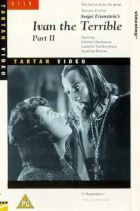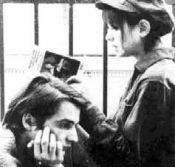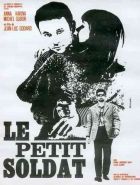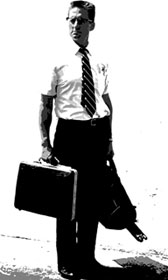Your Chosen Genres
[ Politics ]
[ Art House ]
[ Classics ]
Can be Combined with Other Genres. Click here to Combine Genres!
Currently Selected:
•
Politics
•
Art House
•
Classics
CertificationPG
Our Rating
Part 1 of Wajda's trilogy of wartime films, the hopeful one, is set in Wola, a working-class area of Warsaw in 1942, and deals with the graduation of a bunch of semi-delinquent street kids, through individual acts of defiance and courage, into a youth resistance group. The heroism is not simple, neither loyalties nor self-sacrifice are assured, but united they will be.
find out more...
Certification12
Our Rating
The last of Wajda's famous trilogy, the one that signifies despair, has Cybulski, the 'Polish James Dean', as a young fighter no longer killing Germans but instructed to assassinate a recently appointed communist official. His deepening love affair with a hotel barmaid has him starting to question the value of his struggle. Superb.
find out more...
CertificationU
Our Rating
A landmark in the history of the cinema; it was ranked Number 1 in the American Film Institute's 100 greatest films of all time in two polls (1998 and 2007) of more than 1,500 film industry movers and shakers and again by UK directors in a BFI poll. "Citizen Kane" narrates the rise and fall of a newspaper tycoon driven by a childhood obssession and is loosely based round the life of William Randolph Hurst, who tried to have it banned, but incorporates elements from the lives of other fat cats il
find out more...
CertificationE
Our Rating
The term 'free cinema' was coined by critic and filmmaker Lindsay Anderson in early 1956 when he, Karel Reisz, Tony Richardson and Lorenza Mazzetti showed a programme of their short films at the National Film Theatre. Although the name was intended only for that screening, it proved so successful that five more programmes were shown under the same banner between 1956 and 1959.
find out more...
Certification18
Our Rating
Before the student riots up the Champs-Elysee, Sweden came out with this film, which 'Describes the difficulties of a radical in a country with no serious problems'. Random questions asked by a young girl to members of the public compares middle-aged middle-class apathy with the social upheavals of the 60s and, with its added explicit sexual content, it was no wonder it was banned. This dvd also includes Sjoman's follow-up, "I Am Curious Blue", which continues Lena's journey of self discovery.
find out more...
Certification12
Our Rating
In Fellini's sardonically humorous, yet powerfully dramatic, 'Il Bidone' three small-time crooks impersonate priests in Rome to con poor people out of their money. Broderick Crawford is extraordinary as the group's world-weary leader whose chance meeting with his own daughter opens his eyes to his wrongdoing. Too late, he suffers a crisis of conscience in this absorbing tale of hope, desperation and tragedy.
find out more...
CertificationPG
Our Rating
A masterpiece of Soviet Socialist Realism. In 1547, Ivan IV (1530-1584), archduke of Moscow, crowns himself Tsar of Russia and sets about reclaiming lost Russian territory. In scenes of his coronation, his wedding to Anastasia, his campaign against the Tartars in Kazan, his illness when all think he will die, recovery, campaigns in the Baltic and Crimea, self-imposed exile in Alexandrov, and the petition of Muscovites that he return, his enemies among the boyars threaten his success. Chief among
find out more...
CertificationPG
Our Rating
Ivan takes on the boyars in a battle for power in the second part of Eisenstein's projected trilogy. This was not released till 1958 as Stalin sensed its critical nature, especially its depictation of the secret police. Eisenstein's untimely death robbed us of the chance to see the final part. A Classic.
find out more...
CertificationPG
Our Rating
Godard's brilliant dialectical farce in which five Parisian students, members of a Maoist cell, discuss the implications of the Chinese Cultural Revolution and the chances of using terrorism to effect a similar upheaval in the West. Dazzlingly designed as a collage of slogans and poster images, it was criticised at the time for playing with politics. But Godard was well aware what he was doing and his film stands as a prophetic analysis of events of May 1968 in all their desperate sincerity and
find out more...
Certification15
Our Rating
Godard does 'serious' with his attempt to make some sense of the Algerian Situation in the late 50s and France's role in it's future, following events through the proverbial 'little soldier', Bruno, a young Frenchman living in Geneva, who belongs to a right-wing terrorist group, and meets and falls in love with a young woman who belongs to a left-wing terrorist group. Complications ensue when the man is suspected by the members of his terrorist group of being a double agent.
find out more...











